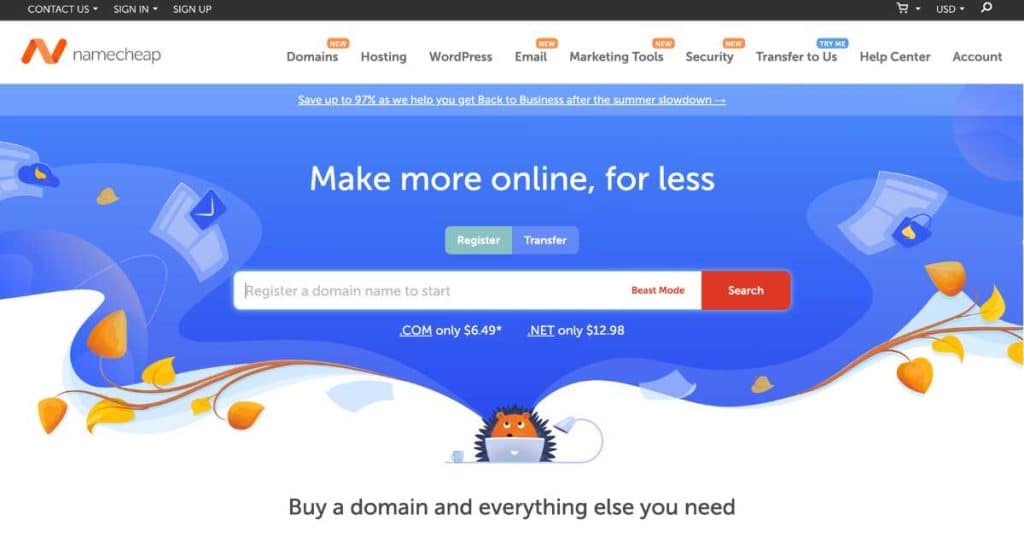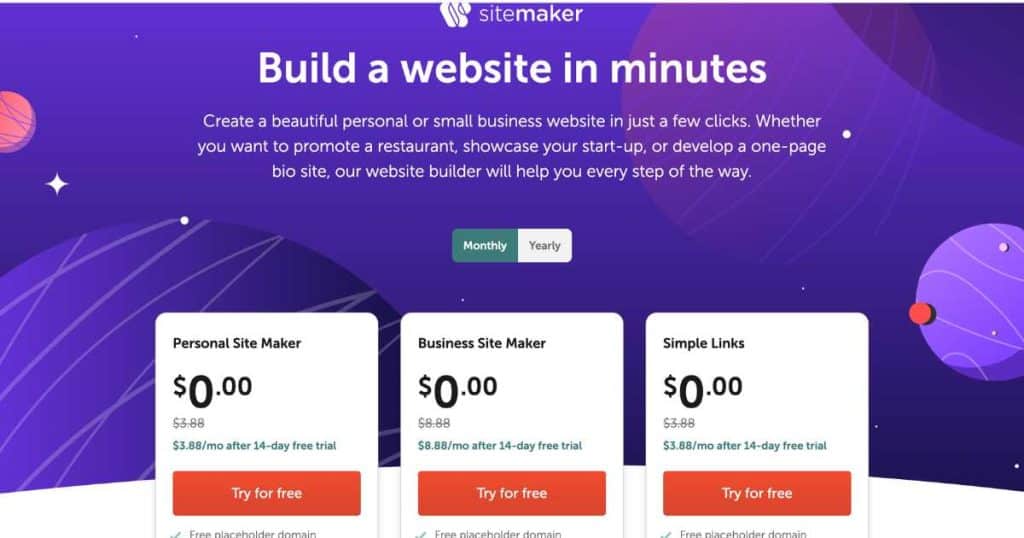This blog post dives into the top 10 disadvantages of Namecheap, a popular web hosting and domain registrar service used by many.
If you’ve clicked on this article, you’re likely considering using Namecheap to host your existing or new website.
Don’t get me wrong, Namecheap is a cost-effective, user-friendly, and popular web hosting and domain registrar solution for many entrepreneurs, small businesses, and individuals.
But it’s important to note that it’s not without its drawbacks!
Read more: Top 8 Cheap Web Hosting Providers For Small Business.
Top 10 Disadvantages of Namecheap
In this comprehensive blog post, I’ll dive deep into what I believe are the top 10 disadvantages of using Namecheap for web hosting and domain registration.
From customer support to performance and pricing issues, I’ll bring an unbiased and honest look at the potential hurdles you might face if you choose Namecheap.
So, what are the disadvantages of Namecheap? Let’s find out.
Read more: Top 10 Advantages Of Namecheap.
What Is Namecheap?

Namecheap (as its name cleverly implies) is an affordable and popular domain registration and web management service suited for individuals and businesses.
Born over two decades ago, Namecheap still continues to rise, with over 17 million domains under Namecheap management today.
But Namecheap’s offerings extend far beyond just domain registration and management!
The company is also a reputable web hosting solution, ensuring that websites are always live, accessible, and fully functional.
Read more: Top 5 Hostinger Alternatives.
What Are The Top 10 Disadvantages Of Namecheap?
Namecheap certainly has the potential to elevate your online presence to new heights.
But, like all online tools, it’s not perfect. And that’s okay!
Before settling on Namecheap as your go-to for domain registration and web hosting, it’s important to consider what the platform maybe doesn’t do so well.
Only then will you be able to decide whether it’s the right fit for you.
So, let’s get stuck in and explore the top 10 disadvantages of Namecheap now.
1. Plan Renewal Prices

First up on this list of Namecheap disadvantages is their sneaky renewal pricing scheme.
With shared hosting pricing plans starting from just $1.58 (for two years), Namecheaps’ plans certainly attract small business owners on a budget.
But the trouble arises when you have to renew your plan type…for over double the price!
For example, the ‘Stellar’ shared pricing plan is just $37.88 per year for the first two years, and then it significantly increases to $83.88 for the next two years.
The same applies to Namecheap’s business email services, domain prices, and SSL certificates.
It kind of feels like Namecheap just lures you in with cheap pricing plans, deals, and discounts to maintain the ‘cheap’ image.
In reality, it can become more expensive in the long term than other web hosting platforms!
Read more: Hostinger vs Namecheap.
2. Confusing Pricing Plans
Don’t get me wrong, it’s fantastic that Namecheap offers various shared, VPS, WordPress, reseller, and dedicated pricing plans.
But in all honestly, this is pretty confusing for beginners, especially those who don’t know which hosting package they require.
Plus, each plan type (and tier) has its own features and limitations, meaning you must carefully trudge through the details to avoid unexpected constraints or costs.
This complexity is further compounded by promotional prices that apply only for the first year or term!
Additionally, domain names, security features like SSL certificates and CDNs, business email services, and marketing tools aren’t included in Namecheaps’ hosting plans.
This can confuse users even more!!
3. Limited Data Centers

Did you know Namecheap only offers a few data centers globally to manage its web hosting and related services effectively?
These are Phoenix, Arizona (US), Nottingham (UK), and Amsterdam (EU).
Other hosting competitors like Hostinger offer many more to ensure that your website runs at optimal speed at all times.
Could this be a contributing factor to the slow performance speeds users have reported while using Namecheap? (more on this Namecheap disadvantage soon).
Plus, it’s also worth mentioning that Namecheap’s UK shared pricing plans are $1 more expensive than the US or EU – what’s with that??
Read more: Top 10 Disadvantages Of Hostinger.
4. Limitations On Lower-tiered Plans
While Namecheap’s entry-level plans are affordable, you certainly get what you pay for, with significant restrictions regarding features and tools.
Firstly, you can only host three websites on the ‘Stellar’ shared hosting plan, and there are also limitations on storage space.
Plus, lower-tired plans don’t offer advanced features like automatic backups or access to higher-performance servers, which is a shame.
And although all plans come with an SSL certificate, it’s only free for the first year!
5. Basic Website Builder

Okay, and we’re halfway through this list of the top 10 disadvantages of Namecheap!
You might be wondering….can I also build a website with Namecheap?
While you can technically build a website using Namecheap’s website builder, SiteMaker, it’s pretty limited in terms of customization, templates, analytics, and tools.
Plus, there’s no online store functionality, so the platform isn’t suitable for eCommerce teams.
This is pretty disappointing, considering other Namecheap competitors like Wix and Hostinger offer pretty impressive website builders.
Read more: Top 5 Website Builders For Small Business
6. Poor Website Performance
Namecheap is generally pretty reliable; however, many users report poor website performance, especially with lower-tiered sharing plans.
A study conducted by Cybernews also confirms this with poor performance and speed testing findings across the board.
This isn’t entirely surprising, as websites hosted on the same server can experience traffic spikes, leading to resource contention.
As a result, some users report slow website loading speeds, downtime, or server unresponsiveness.
However, Namecheap promises 100% uptime on their shared hosting plans!
While it employs SSD hardware, RAID configuration, and regular backups, the performance might not meet the expectations of all shared plan users, especially during peak times.
7. Domain Registration Limitations

Namecheap offers one free domain name registration with all shared hosting plans.
However, it’s important to note that this perk is only available when opting for the 1-year or 2-year subscription terms!
Plus, .com and .co domain names (two widespread top-level domains for professionals) aren’t included in Namecheaps’ ‘Stellar’ plan.
Instead, they’re provided at a discounted rate within the premium Stellar Plus and Stellar Business plans.
8. No Phone Support
Okay, we’re almost at the end of this top 10 disadvantages list!
Namecheap prides itself on around-the-clock customer support through live chat and a ticket-based system.
And while this is awesome, there’s no phone support, which is a huge disadvantage if you and your team prefer or require more immediate and direct assistance!
While digital communication methods like live chat are efficient, they simply can’t replace the level of interaction and clarity that a phone conversation can.
This is especially true in complex situations where verbal communication might make explaining the issue easier and quicker.
Read more: How Much Does a Small Business Website Cost?
9. Migration Problems

While Namecheap promotes a straightforward website transfer process, the reality is actually more complex and challenging.
Firstly, users have reported unexpected downtime and technical difficulties during the transfer process.
These technical issues include data loss or corruption, misconfigured DNS settings, or compatibility issues with Namecheap.
Additionally, migrating can involve reconfiguring email services, plugin/functionality compatibility checks (WordPress websites), and alterations to database settings.
Those without extensive technical background may also find this challenging.
10. Limited Advanced Features
While Namecheap is renowned for its affordability and ease of use, you might be disappointed if you’re looking for advanced hosting capabilities.
Features such as advanced caching, staging environments, or built-in performance optimization are simply not available on the platform.
These tools are paramount for developers, eCommerce sites, or large businesses that prioritize website speed and efficiency.
I believe Namecheap is a pretty good hosting option for personal websites, small blogs, or startups.
However, if your website is more complex, you might need to install additional plugins or rely on third-party services.
Alternatively, you may be better off using another hosting provider specializing in advanced hosting solutions altogether!
Stews Final Thoughts
And you made it!
Despite this article shedding light on the top 10 drawbacks of Namecheap, I still believe it’s a solid choice for small teams after an easy-to-use, affordable web hosting solution.
And while recognizing the disadvantages of Namecheap is critical, it’s equally important to read about the platform’s advantages before making any decisions.
By thoroughly evaluating both the pros and cons of Namecheap, you can confidently decide whether it is the best choice for you.
Do you agree with my list of Namecheap disadvantages above? Let me know.

